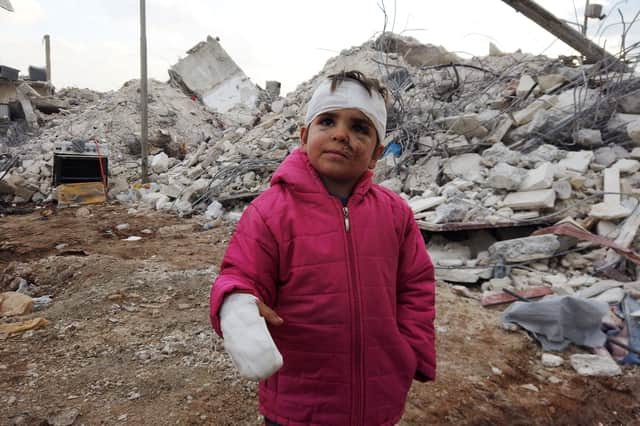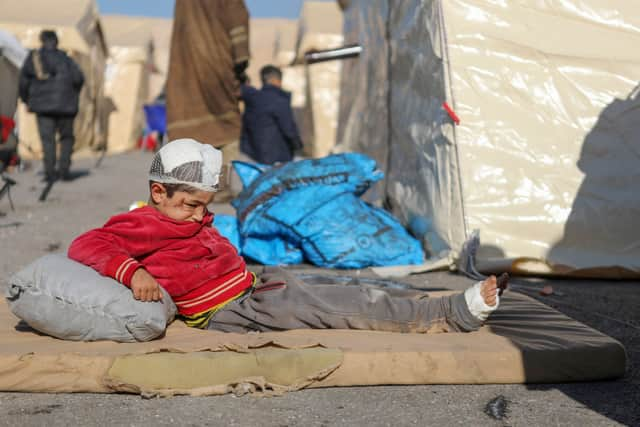How to support the Disasters Emergency Committee’s Turkey-Syria Earthquake Appeal - and where your money goes


NationalWorld is again partnering with the DEC to help them raise awareness of their fundraising campaign, this time to help the people of Turkey and Syria in the aftermath of the devastating earthquakes.
A series of devastating earthquakes have hit southern Turkey and north-west Syria, killing more than 22,300 people and injuring many more. Thousands of buildings, including hospitals and schools, have collapsed and infrastructure has been badly damaged.
Advertisement
Hide AdAdvertisement
Hide AdThe first 7.8 magnitude quake hit in the early hours of the morning when people were sleeping. There have been a number of aftershocks and a second 7.5 magnitude earthquake.
Many of us have watched on in horror this past week as scenes have unfolded of buildings collapsing, survivors pulled from the wreckage, families searching desperately for loved ones. We see communities on a huge scale who are injured, without shelter, cold, hungry, and have lost so much - literally overnight.
As local responders continue their search through the rubble for survivors, and so many have been left without shelter in freezing winter conditions, it is hard for us here in the UK to know how to respond to the scale of humanitarian need, expected to grow even further in the coming days.
DEC charities and their local partners are responding, working with locally-led relief efforts. Their immediate priorities are search and rescue, medical treatment for the injured, shelter for those who have lost their homes, heaters for safe spaces and winter kits with blankets, and warm clothes, as well as ensuring people have food and clean water.
What is the DEC?
Advertisement
Hide AdAdvertisement
Hide AdFor nearly 60 years the DEC has brought together the leading international aid agencies across the UK, alongside the main broadcasters, to provide a clear way for the public to donate and to disperse those funds effectively. So far, the reaction to this appeal has been astonishing. More than £30 million raised across the UK in the first day.
This money is already allowing our member agencies to rapidly increase their relief operations on both sides of the Turkey-Syria border. The expertise of our member networks, like the Red Cross and Save the Children, and their long-established links with local charities and partners, means we are able to rapidly respond to what is needed, as families struggle to come to terms with the losses they face and their sudden, urgent needs for survival.
Many are particularly vulnerable in the current conditions, with exposure to the cold weather especially dangerous to older people, children, pregnant women, those with existing medical conditions, and refugees and displaced people. With water systems likely to have been destroyed, the risk of the spread of waterborne diseases such as cholera is very real.
In times of such enormous challenge, we look to those who are based locally and who have specific expertise to lead us in the response.


Advertisement
Hide AdAdvertisement
Hide AdIn Turkey, organisations like Islamic Relief and Oxfam have partners on the ground providing shelter, food, medical supplies, water, sanitation and hygiene assistance. The country’s president says the disaster is the worst they have seen in 84 years. It is unclear at this stage the extent of the damage to civilian infrastructure, but it’s estimated that 6,444 buildings have collapsed in Turkey, including hospitals and schools, near the town of Gaziantep close to the epicentre of the first earthquake.
In Syria, similar relief efforts are underway to provide shelter, food, medical assistance and water. Our member organisations like Tearfund and Christian Aid are also working hard to supply basic household items, winter kits, and provide extra protection for children. Here, the worst affected areas aren’t under the control of the Syrian Government and many families are now living in tents or other rudimentary accommodation after years of civil war. Aid workers say these people are now hosting families whose homes have been destroyed by the earthquake.
The best way to help Turkey and Syria
We hope this message can get out to all those people keen to help but are currently thinking about sending what they have in their homes via local charities. However well-intentioned, that may not be the best way to help. What may appear to be the best response today may not be what the people caught up in the crisis might need today or in the days and weeks to come.
If people already have large stockpiles of generously donated goods, then perhaps they could consider selling them in person or online and then donating the proceeds. For all the reasons outlined above, if you haven’t already donated to the appeal then we would urge you to do so now.
Where your money goes
Advertisement
Hide AdAdvertisement
Hide AdThe money you give will be shared with 14 of the 15 DEC members who will translate that goodwill into urgently needed food and shelter, blankets and water for those affected. It will also be used to provide medical support and supplies for people who have been injured.
At a time when it’s hard to know how to respond to a crisis of this magnitude, with so many people affected and uncertainty around who to trust - one constant is the generosity of people across the UK and elsewhere and their desire to really help those most in need.
Since it was founded in 1963, the DEC has been best placed to make sure that your donations result in practical help getting to those in most need as quickly as possible, and that the help has a lasting impact, even after the news headlines have moved on.
None of us know yet the full extent of the devastation, but with your continued support, we will do our best to help as many families as we can and give them hope in the difficult days, weeks and months to come.
Comment Guidelines
National World encourages reader discussion on our stories. User feedback, insights and back-and-forth exchanges add a rich layer of context to reporting. Please review our Community Guidelines before commenting.
